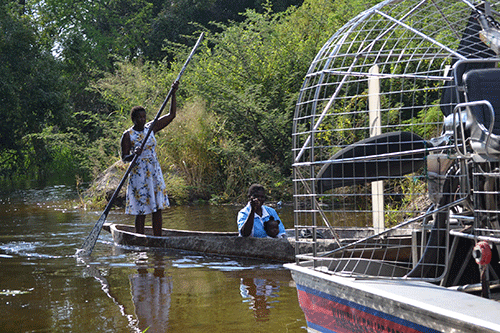The Zambezi regional disaster risk management has called on relevant sectors to provide urgent humanitarian aid in the form of tents, food items, mattresses, life jackets, boat engines and fuel, snake repellents, mobile clinics, mosquito nets, as well as disinfectants for toilets and pit latrines.
These were the urgent needs identified by the disaster risk management team with education and health officials following an assessment of nine schools that have been negatively affected by floods in the Kabbe South and North constituencies of the Zambezi region.
However, the disaster management team, in consultation with school management and community members, jointly agreed teaching and learning continue at each school, as all schools still have enough dry space.
The affected primary and combined schools are Namiyundu, Nankuntwe, Mpukano, Muzii, Kasika, Ivilivinzi, Ikaba, Mbalasinte and Nsundwa.
The team indicated for a total of 1 603 learners with 122 staff members of the nine affected schools, an amount of more than N$12 million is needed for food items to cater to the affected schools.
Meanwhile, a total of 148 sleeping tents, with about 1 539 mattresses, are urgently needed, as learners currently sleep on the floor exposed to dangerous animals, such as snakes, crocodiles and hippos.
The team found out that at most schools, although the water supply system is enough to cater to both the school and the community hostel, the water quality was reported to be of poor standard.
Some schools have sufficient ablution facilities (flushing toilets and pit latrines), but the septic tanks of the toilets are currently full, and this limits the usage of the facilities.
Some pit latrines were also noted to be full and unusable. As a result, both learners and staff are sometimes forced to relieve themselves in the bushes when nature calls, exposing them to dangerous animals, especially during the night.
Some learners have since relocated from their homes and are staying in a community hostel consisting of mud structures and tents.
At many schools, it was observed that the learners sleep on the bare floor without any mattresses and poor bedding.
The girls’ accommodation, made of a mud structure, does not have a door to prevent snakes and other wild animals from entering and causing harm to learners.
Due to the floods, the schools have reported a high number of roaming dangerous snakes, while others like Kasika Combined School reported that there are hippopotamuses as well as buffaloes that roam around the school at night.
At Ikaba Combined School, four classrooms were observed to be highly infested by bats, causing an unbearable smell that is not conducive to teaching and learning.
Some learners have not relocated to the school premises due to some parents citing inadequate food to cater to two households.
Most parents expressed willingness to relocate their children to the schools, but there are not enough accommodation facilities for all.
The affected schools are also in need of about 1 539 mosquito nets and nine boats with operational engines equipped with 122 life jackets to ferry learners and teachers in the dangerous flood water.
The team also said the schools need about 900 litres of fuel for the boats and 180kg of sodium hydroxide to serve as a disinfectant.
This means 100 litres of fuel is needed per month for each school, calculated for two trips for each school.
Some schools reported confirmed cases of malaria, while in others only scabies was reported, which is mainly a result of poor hygiene.
Some red and black ants were also seen around the school premises. These ants are said to bite learners while asleep.
It was also observed that the learners do not have mosquito nets to prevent them from contracting malaria.
Some schools currently have no health facilities close to them and no health extension workers allocated to these areas.
Relocation of schools to higher ground at the time of conducting the assessment was not an option.
Absenteeism and late-coming have become a cause for concern for the affected schools.
This is because families use dugout canoes to ferry the kids to and back from school as well as for other household activities.
– anakale@nepc.com.na


